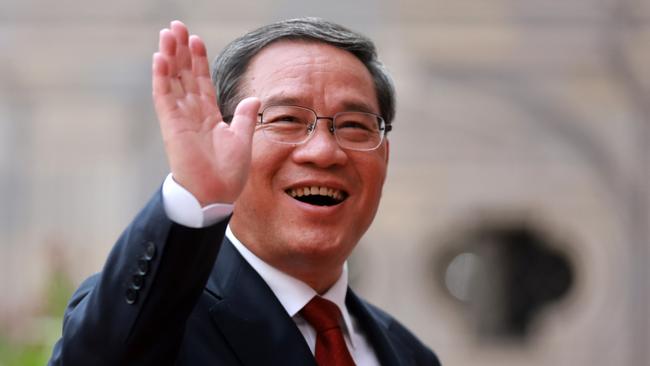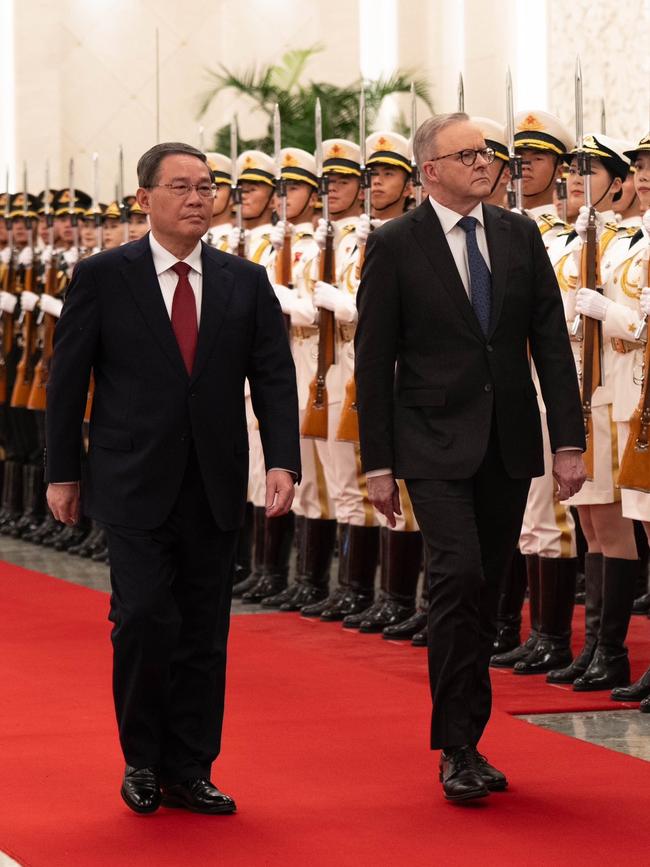Security barrier to China’s panda diplomacy
Police will erect a fence on the lawn in front of Parliament House to separate ‘patriotic’ Chinese from human rights protesters when China’s No. 2 leader visits Canberra.

Police will erect a fence on the lawn in front of Parliament House to separate “patriotic” Chinese from human rights protesters when China’s No.2 leader visits Canberra on Monday amid fears of clashes between the two camps.
As pro-Beijing Chinese community associations rally their members to welcome Premier Li Qiang, a coalition of human rights groups have called for peaceful protests against the “henchman of dictator Xi” – a reference to Chinese President Xi Jinping.
Australia Tibet Council executive director Zoe Bedford said the anti-China protesters would target Beijing’s “appalling” human rights record, and the Albanese government’s failure to take a more forceful stand against Mr Xi’s regime.
The Australian Federal Police declined to comment on security arrangements but AFP plans seen by The Australian show a physical barrier will be set up on the parliamentary lawn to keep the rival groups apart.
Dr Bedford said: “We understand the Chinese embassy and pro-China groups are organising people to counter-protest and we are concerned about our safety as they have been aggressive and violent towards our peaceful human rights protests in the past.
“This is a part of China’s transnational repression – where the Chinese embassy is attempting to intimidate our community, most of whom are former political prisoners from Tibet.”
The Australian earlier revealed Chinese community associations linked to Beijing’s United Front Work Department sent out messages to their members offering free trips to Canberra to show their support for Mr Li. “We want to show our patriotism,” one said. “Food, accommodation and transport will be provided.”

The security plans came as Anthony Albanese defended China’s investment in a Perth lithium venture, arguing Australian critical minerals would help China slash its carbon emissions.
Mr Li will visit the part-Chinese owned Tianqi lithium processing facility on Tuesday, less than a fortnight after the federal government ordered Chinese companies to divest shares in rare earths miner Northern Minerals.
Asked how China’s stake in the Tianqi venture fitted with the government’s Future Made in Australia agenda, the Prime Minister said: “We export resources to the world, including to China. That’s a source of revenue and wealth here in Australia, as well as contributing globally.
“We have all of the minerals and resources that will power the world in the 21st century. We’ll continue to export our resources. We continue to value foreign investment, but we want to make sure as well that we do move up the value chain.”
Mr Albanese will join Mr Li in Perth for a CEO roundtable organised by the Business Council of Australia. At least 10 Chinese companies are expected to be represented, including the state-owned conglomerate CITIC, the Bank of China, Beijing Energy Group, and the China National Offshore Oil Corporation.
Rio Tinto, Woodside, Fortescue and Wesfarmers will be among the Australian companies represented.
Mr Li will kick off his June 15-18 Australian trip in Adelaide, where he is expected to announce that two pandas on loan at the city’s zoo will have their stay extended. He and Chinese Trade Minister Wang Wentao are also scheduled to meet with winemakers in Adelaide – just a month after Beijing removed punitive sanctions on Australian wine.

Trade Minister Don Farrell said Australia had exported $86m in wine to China since the duties were axed. “This is a great outcome for our wine producers, after three years of trade disruptions, along with natural disasters and global reductions in demand,” Senator Farrell said
But former defence official Peter Jennings said it was absurd that “somehow we are supposed to be grateful China is now removing its coercive sanctions”.
“Is there ever a point where we are going to operate with a bit of self respect in this relationship?” Mr Jennings said.
He said Mr Albanese needed to stand up for Australia in his talks with Mr Li, “but instead we get panda diplomacy”.
“China hasn’t changed any of its strategic objectives. In fact, it has become more aggressive on Taiwan and in its military posturing in the South China Sea,” Mr Jennings said. “The dialogue Mr Albanese is focused on is only possible because it does not deal with any issues of substance. It’s just a sham, really.”




To join the conversation, please log in. Don't have an account? Register
Join the conversation, you are commenting as Logout